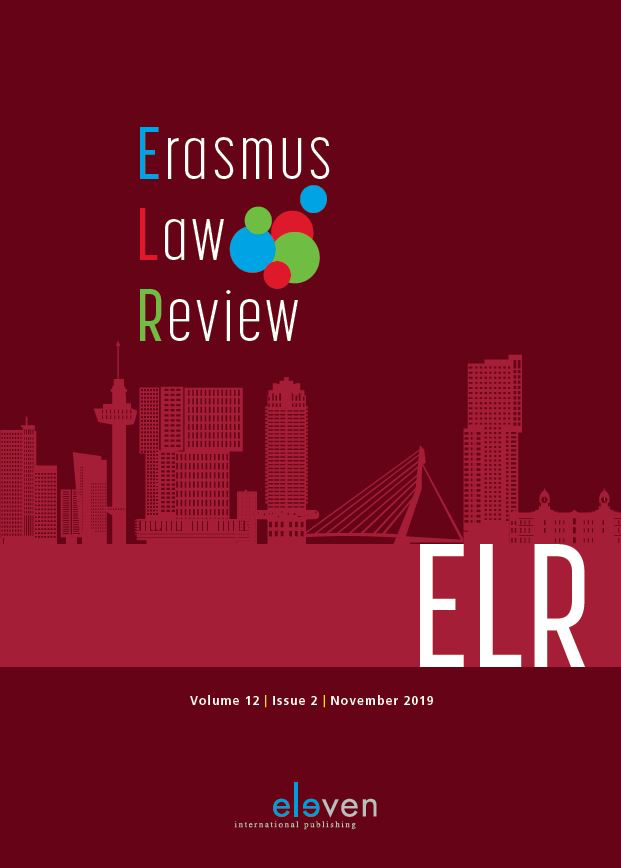|
In the nineteenth and part of the twentieth century, the Kingdom of the Netherlands had colonies both in the West Indies and in the East Indies. This article will focus on the Dutch colonies in the East Indies, i.e., the Netherlands Indies – present-day Indonesia, and will discuss whether the First World War had an impact on the constitutional law for the Netherlands Indies. |


Erasmus Law Review
About this journalSubscribe to the email alerts for this journal here to receive notifications when a new issue is at your disposal.
| Article |
|
| Authors | Willem H. van Boom |
| Author's information |
| Article |
|
| Keywords | Commission of Inquiry, constitutional law for the Netherlands Indies, Dutch colonial thinking, ethical policy, First World War, November promises, People’s Council |
| Authors | Nick Efthymiou Ph.D. |
| AbstractAuthor's information |
| Article |
|
| Keywords | First World War, law of obligations, unforeseen circumstances, force majeure, frustration of contracts |
| Authors | Janwillem Oosterhuis Ph.D. |
| AbstractAuthor's information |
|
European jurisdictions can be distinguished in ‘open’ and ‘closed’ legal systems in respect of their approach to unexpected circumstances occurring in contractual relations. In this article, it will be argued that this distinction can be related to the judiciary’s reaction in certain countries to the economic consequences of World War I. The first point to be highlighted will be the rather strict approach to unexpected circumstances in contract law that many jurisdictions had before the war – including England, France, Germany, and the Netherlands. Secondly, the judicial approach in England, France, Germany, and the Netherlands to unexpected circumstances arising from the war will be briefly analysed. It will appear that all of the aforementioned jurisdictions remained ‘closed’. Subsequently, the reaction of the judiciary in these jurisdictions to the economic circumstances in the aftermath of the war, (hyper)inflation in particular, will be analysed. Germany, which experienced hyperinflation in the immediate aftermath of the war, developed an ‘open’ system, using the doctrine of the Wegfall der Geschäftsgrundlage. In the Netherlands, this experience failed to have an impact: indeed, in judicial practice the Netherlands appears to have a ‘closed’ legal system nevertheless, save for an ‘exceptional’ remedy in the new Dutch Civil Code, Article 6:258 of the Burgerlijk Wetboek (1992). In conclusion, the hypothesis is put forward that generally only in jurisdictions that have experienced exceptional economic upheaval, such as the hyperinflation in the wake of World War I, ‘exceptional’ remedies addressing unexpected circumstances can have a lasting effect on the legal system. |
| Article |
|
| Keywords | American Society of International Law, Peace-Through-Law Movement, Harvard Law Library: League of Nations, President Woodrow Wilson, Pre-Wilsonianism |
| Authors | Dr Ignacio de la Rasilla del Moral Ph.D. |
| AbstractAuthor's information |
|
The generation of American international lawyers who founded the American Society of International Law in 1906 and nurtured the soil for what has been retrospectively called a 'moralistic-legalistic approach to international relations' remains little studied. A survey of the rise of international legal literature in the United States from the mid-nineteenth century to the eve of the Great War serves as a backdrop to the examination of the boosting effect on international law of the Spanish American War in 1898. An examination of the Insular Cases before the US Supreme Court is then accompanied by the analysis of a number of influential factors behind the pre-war rise of international law in the United States. The work concludes with an examination of the rise of natural law doctrines in international law during the interwar period and the critiques addressed by the realist founders of the field of 'international relations' to the 'moralistic-legalistic approach to international relations'. |
| Article |
|
| Authors | Paul Mevis and Jan M. Reijntjes |
| AbstractAuthor's information |
|
The Versailles Treaty (Art. 227) called for the prosecution of Wilhelm II, the German ex-Kaiser. Because of the refusal of the Dutch Government to surrender Wilhelm, a trial never took place. This paper tries to elaborate some questions concerning this possible trial. What was the background of the said Treaty paragraph? What would have happened when Wilhelm had been surrendered? Based on a report of a special committee to the peace conference, the possible indictment is discussed. The authors try to elaborate some thoughts for answering the question about Wilhelm’s criminal responsibility, especially as author of the war (‘ius ad bellum’) by starting an aggressive war and/or by violating the neutrality of Belgium and Luxemburg. Wilhelm’s possible responsibility for violations of the ‘ius in bello’ (laws and customs of war) in Belgium, France, and Poland and/or by ordering an unlimited submarine war is discussed as well. It is concluded that it would have been very difficult for the tribunal to have Wilhelm find criminal responsible for the indictment, except for the violation of the neutrality of Belgium and Luxemburg. But then, the tribunal would have been obliged to answer fundamental questions about the command responsibility of Wilhelm. From a point of view of international criminal law, it is rather unfortunate that the unique opportunity for a ‘Prologue to Nuremberg’ was not realised, although a trial would not have made history take a different turn than it did in the twentieth century after the ‘Great War’. |

 Issue 4
Issue 4